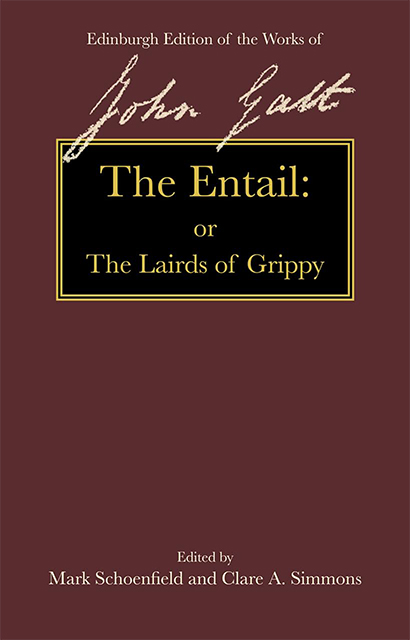Introduction
Published online by Cambridge University Press: 25 October 2023
Summary
Mr North
Henceforth I patronize prose.
Mr Tickler
So does Mr. Blackwood. Confound him, he is inundating the public. I wish to God Galt were dead!
Mr Blackwood
… Gracious me! Before he has finished the Lairds of Grippy?
Mr Tickler
Well, well, let him live till then, and then die.
This teaser for John Galt's The Entail, couched in an exasperated professional jealousy by the fictive Mr Tickler, comes in the “Noctes Ambrosianae” instalment for September 1822 in Blackwood's Edinburgh Magazine. 1822, the year of George IV's visit to Edinburgh, had already been busy for Galt. In January he published his first three-volume novel, Sir Andrew Wylie, of that Ilk. Later came The Provost; The Steam-Boat, including an extensive description of George IV’s coronation and reprinted with significant revision from Blackwood’s Edinburgh Magazine as a stand-alone volume; and “The Gathering of the West,” also in Blackwood’s. Amid this bustle establishing himself as one of Blackwood's foremost contributors, Galt completed and published The Entail, as “by the author of Annals of the Parish, Sir Andrew Wylie, &c,” a merely technical anonymity as his authorship was widely known. William Blackwood paid him £525 for the copyright. Although the novel's title-page is dated 1823, its dedication to the King is inscribed 3 December 1822, and in a letter from London of 11 December 1822, Galt describes the “great wrath” of the bookseller J. M. Richardson at the early arrival of the book. Galt soothes him, convincing him to take a hundred copies, by putting it on “next years account.” The book appeared in time to be reviewed in the Literary Gazette for 21 December 1822 and in Blackwood's January 1823 issue. Already established as a chronicler of western Scotland, Galt was now venturing into the historical novel, something that he would continue in Ringan Gilhaize and Rothelan.
Although Walter Scott had popularised historical fictions, his works, such as Waverley, Ivanhoe, and his three novels of 1822—The Pirate, The Fortunes of Nigel, and Peveril of the Peak—focus actions around a narrow time frame of a year or two, a representative sliver of a historical epoch. The Entail, by contrast, coordinates the tribulations of three generations of a family with nearly a century's expanse, making it, in Ian Duncan's words, a “vehicle for a critical argument with the genre of national historical romance practiced by Scott.”
- Type
- Chapter
- Information
- The EntailOr, The Lairds of Grippy, pp. xvii - livPublisher: Edinburgh University PressPrint publication year: 2022



